THE NAMIBIAN LION TRUST
The Namibian Lion Trust came into operation in January 2020, not an ideal time to launch a new charity! It is run by Tammy Hoth-Hanssen and has its roots in Afro-Leo and AfriCat North. Its principle aim is to support the local community farmers to live successfully alongside the lions that roam the area.
Key features of the project are the well-researched methods, local lion guards who are community farmers themselves, gps collars on lions to enable them to be tracked and an early warning system to help alert farmers if lions are in their vicinity.
A prolonged drought for ten plus years in the area followed by covid have taken their toil on man and beast. The good news is that the government has recently taken a more active interest in lion conservation (in addition to the efforts to conserve black rhino in the wider Damaraland area.) The result of this has been small pockets of funding, an increased number of lion guards/rangers across the region and closer cooperation with the NGO’s in the area. However, it is far from easy and remains an uphill battle to secure the funds needed to build a better future for all concerned.
In order to ensure the long-term survival of the lion (Panthera leo), the Namibian Lion Trust (Reg#T298/2019) has developed three interdependent programmes to support the recovery, survival, and range-wide expansion of this Big Cat species, namely For Lions – For Life – For Our Future.
Visit https://namibianliontrust.org for more information.
FOR LIONS
Research essentially gathers accurate data on the demography and ecology of the lion within Protected Areas and on farmland; the monitoring of individuals and groups or prides, indicate the driving forces which stimulate lion to move, also quantifying both the degree of human-lion conflict and the impact it has on people living adjacent to parks and reserves as well as in wilderness areas, including communal farmland. Knowledge of lion movement patterns and home ranges in relation to livestock herds and settlements together with livestock protection programmes, encourages tolerance and enables co-existence.
FOR LIFE
Despite the growing willingness to ‘live with wildlife’, communal farmers struggle to survive in the harsh environment of Namibia’s north-west. An increasing number of farmers, however, now combine traditional methods with modern, arid-adaptive livestock and rangeland management techniques. Dedicated to protecting the lion as well as mitigating farmer-lion conflict, the Lion Guards monitor the whereabouts of both collared and uncollared lion in order to establish movement patterns. Together with the data retrieved from the GPS-Satellite collars, the widely dispersed trail cameras and lion-sightings by community members, the Lion Guards are able to forewarn farmers, resulting in fewer losses to predation thereby contributing towards greater understanding and acceptance of conflict wildlife.
FOR OUR FUTURE
The Namibian Lion Trust is dedicated to empowering communal farming communities to better manage and protect their livestock, ultimately mitigating conflict and minimizing the retaliatory killing of predators. Through Conservation Education and holistic rangeland management programmes, otherwise subsistence farming practices may be augmented to uplift livelihoods, regaining economic stability.
Namibian Lion Trust 2023 Award Winners
The work of a Lion Guard is never done: a change of heart and mind-set, attitudes and behaviour, especially ‘modernizing’ age-old farming practices, takes time, determination and steadfastness… but will bring us all one step closer to co-existence between man and lion. (Tammy Hoth-Hanssen, Founder Namibian Lion Trust).
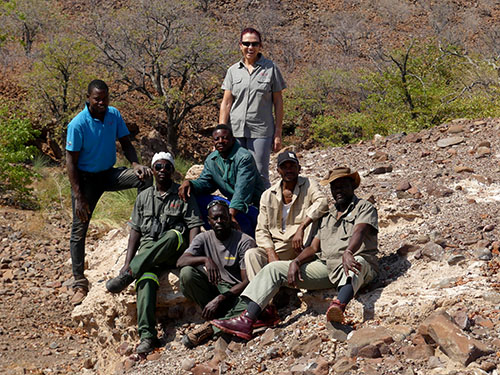
The Kunene Lion Ranger Programme (of which Namibian Lion Trust is a part) has brought together key people, plus some international funding and facilitated important developments.
This project clearly needed to be on a landscape basis within the Kunene Region, Northwest Namibia, saw the welcome collaboration initiated in 2020, between the Ministry of Environment, Forestry and Tourism (MEFT), Namibian Lion Trust and several other local and international stakeholders. The net result has increased community support and livestock protection and improved the knowledge of lion numbers and their movement in relation to livestock herds.
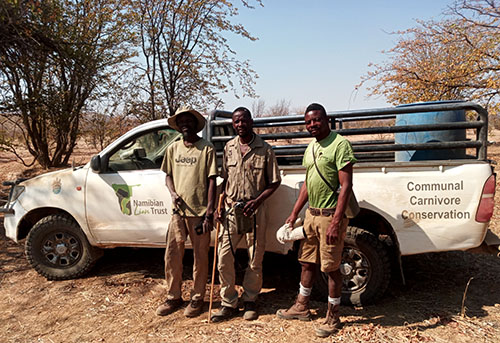
Key elements of this programme are the Lion Guards, Early-Warning Systems and Rapid Response Units to encourage greater tolerance of conflict wildlife, enabling co-existence and improved monitoring.
The 12 Namibian Lion Trust (NLT) Lion Guards are an integral part of the Kunene Lion Ranger Programme. They are dedicated to patrolling conflict-zones and to monitor lion across the northwestern landscape. A major development has been the much-improved Early-Warning Systems, which include Logger-units that are based near homesteads and in recognized lion ranges, together with Vehicle Response Units (GPS-Satellite communications modems fitted into the Rapid Response Unit’s (RRU) vehicles, commonly known as ‘Rovers’, which have notably changed the face of lion conservation in Namibia’s northwest. Whilst on vehicle/foot-patrols real-time lion locations are made available to the First Responder of each Rapid Response Unit, either via communications with the NLT base-station or generated by the ‘Rover’; this apparatus is of utmost importance in locating lion in need of immediate protection.
Regular foot patrols are carried out in ‘hot-spot’ areas in order to mitigate conflict on communal farmland. Trained in the use of SMART (Spatial Monitoring & Reporting Tool), valuable information on Lion whereabouts, livestock management, Lion and livestock mortalities as well as evidence of bushmeat poaching and the dreaded Lion Bone Trade, is collected and evaluated, providing reliable assessments and reports. Each Lion Guard’s patrol history, including total distance and route covered, is recorded.
Meet Jackson Kavetu, the Namibian Lion Trust Senior Lion Ranger and First Responder
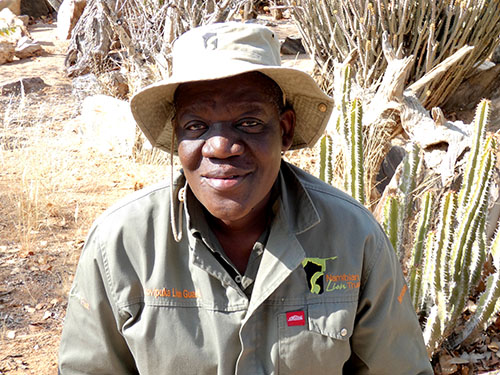
Jackson was raised in the Ehirovipuka Conservancy, Kunene Region, and at a young age became a Conservancy ‘Environmental Shepherd’ or better known as Conservancy Game Guard. Rapidly attaining a senior position, Jackson was hailed as a devoted wildlife champion. Jackson joined the Namibian Lion Trust in 2016, recognizing the need for sound research, community support and the further development of tried-and-tested mitigation options to the ever-present, farmer-lion conflict. A farmer in his own right, he advocates improved livestock management to reduce the retaliatory killing of predators. Jackson recently won an Award for Dedication and Service as a First Responder; this accolade and his winnings, included amongst others, one ram and five ewes, which complement his livestock herd. The 2023 Lion Ranger Awards saw Jackson become Top performing Rapid Response Member. Working in the Ehi-Rovipuka Conservancy Jackson has now become a Rapid Response leader and has single-handedly covered the entire Ombonde landscape over the last few months, responding to conflict, transporting Rangers from their homes to their patrol bases and back, and supporting teams stationed at various bases. Between 21 October 2022 and 20 September 2023, Jackson covered a total of 31,281 km. During this same period, Jackson received 261 notifications and replied to 92%, responding to 90% of all conflict notifications he received.
Meet Rinoveni Tjauira who in the 2023 Lion Ranger Awards gained first place as Top performing Lion Ranger Working in the Omatendeka Conservancy.
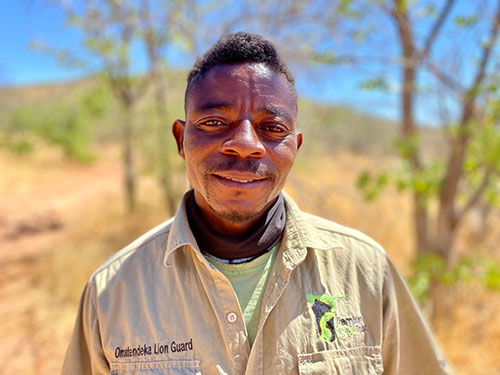
Rinoveni says ‘I like working with Lions as they are very interesting animals and getting to learn about their behaviour from up close, is a good thing. My first patrol was with our First Responder, Jackson Kavetu, where I learned how to use the VHF-Telemetry Tracking system and to set camera traps and, for the first time, I saw a Lion that was very close to us – it was so beautiful I could not stop staring. During my time with Namibian Lion Trust, I have also joined in Anti-Poaching Training, Law Enforcement, Tracking and Predator Behaviour, which has given me more knowledge and confidence in my work.’
Rinoveni has shown incredible dedication and improvement over the last year. He has surpassed expectations this year, patrolling up to 47km on foot per day, covering over 800km in June and over 700km each month in July and August 2023! Between 21 October 2022 and 20 September 2023, Rinoveni covered a total of 4,887 km on foot, spending 1,297 active hours over 290 patrols, representing an average of 17km per patrol. Rinoveni is known among the Rangers as quiet and friendly, always ready to patrol alone or as part of a team. It is a great testament to his dedication and abilities that many of his fellow rangers consider Rinoveni capable of covering a more than 100 km² portion of his conservancy entirely on his own, across inhospitable, rough terrain, weathering extreme conditions ranging from icy cold winds and frost to temperatures above 40 degrees Celsius.
Tammy says We are so proud of both Jackson and Rinoveni’s achievements. (Jackson far right and Rinoveni 2nd from left) From all of us at Namibian Lion Trust, we applaud our Lion Guards for their dedication and determination to mitigate farmer-lion conflict in our bid to enable co-existence. AfriCat UK wishes to sincerely thank and applaud the achievements of Jackson and Rinoveni together with the hard work of all the other Namibian Lion Trust Lion Rangers.
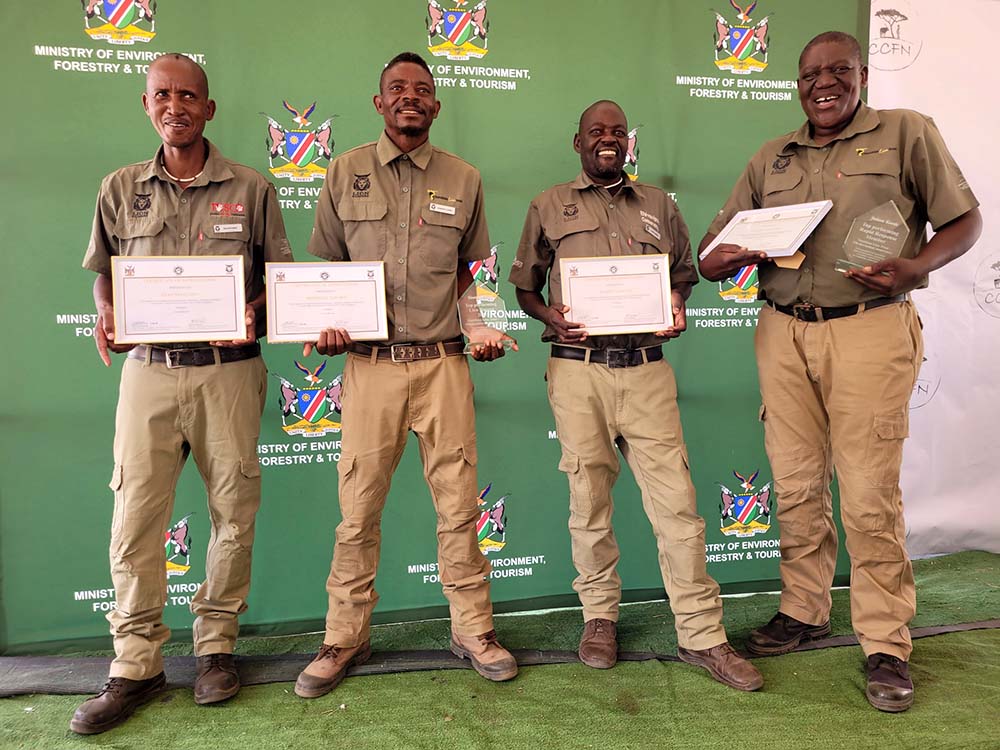
The Kunene Lion Ranger Programme 2023 Award winners includes Jackson and Rinoveni from The Namibian Lion Trust



